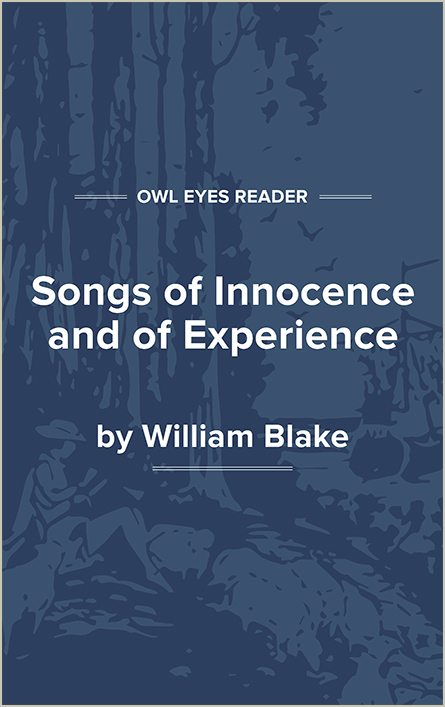Summary
William Blake himself used as a subtitle of his Songs of Innocence and of Experience (which he illustrated and printed in 1794), “Shewing the Two Contrary States of the Human Soul.” Ever since, critics have debated the question of whether Blake intended to present the insoluble paradox of the human encounter with God or simply to cast into verse the contrasting experiences of the innocent and the experienced.
If one considers Blake’s own moving experience as a child that he attributed to his innocent awareness of God’s presence in the world and if, further, one realizes that the experiences of the very young are hardly worth a sympathetic rendering if they are nullified by the experiences of the older and the wiser, then one must take Blake as a visionary poet who knew God both as a child and as a man, wondering throughout at God’s power and his glory, while comforted throughout by God’s love.
Blake used his poetry to mark and define the discernible division between innocence and experience. The experience of the young and innocent is experience in the course of the movement toward evil and the struggle against evil, while the experience of the older, which includes the experience of guilt, is lightened by a kind of innocent wonder at God’s love and forgiveness. The illuminating fact that Blake switched poems back and forth between innocence and experience—himself confused or struck by the ambiguity of the human encounter with God in God’s world—reveals the conviction that whether a song is one of innocence or of experience, it is of the contrary states of the human soul.
For the most part, the Songs of Innocence are celebrations of the shepherd in his loving care of the lamb. One realizes through the child’s experience that relative to God’s care, all persons are lambs; relative to his knowledge, will, and power, all persons are innocent. The child’s celebration of God’s love is for all persons, both the innocent and the experienced; here, in the mouths of babes, are the truths experience has forgotten. Thus, in his first poem, “The Shepherd,” Blake writes that the Shepherd “shall follow his sheep all the day,” that “he hears the lambs [sic] innocent call,” and that “He is watchful while they are in peace.”
Human beings, however, are not simply lambs. In “The Ecchoing Green” (Blake’s spelling), the initial image is of the sun’s rising, the happy skies, the singing birds, the ringing bells, and the children’s sporting on the green. But under the oak the old folk sit and, although laughing at the children’s play, remember, surely with some regret, that “Such such were the joys,/ When we all girls and boys,/ In our youth time were seen,/ On the Ecchoing Green.” The children become weary, the sun descends, the sports have an end, and there is no more playing “On the darkening Green.” The human adventure, then, is from childhood to age, from innocence to experience, from light to darkness, from spontaneous joy to profound sorrow. This human passage, inevitable but both threatening and promising at once, is anticipated in the image of the children’s returning to the laps of their parents as the playing ends and the green darkens.
Another kind of cloud, here symbolic not of the course of nature but of the inevitability of confusion and suffering, is thrown over innocence in Blake’s poem “The Little Black Boy.” The poem begins, “My mother bore me in the southern wild,/ and I am black, but O! my soul is white,/ White as an angel is the English child:/ But I am black as if bereav’d of light.” The child’s mother tells him that “we are put on earth a little space,/ That we may learn to bear the beams of love” and she promises him that “when our souls have learn’d the heat to bear/ The cloud will vanish . . .” and the child responds that when “I from black and he from white cloud free,” he and the English boy will play joyfully around the tent...
(The entire page is 1,887 words.)
Owl Eyes subscribers get unlimited access to our expert annotations, analyses, and study guides on your favorite texts. Master the classics for less than $5/month!

